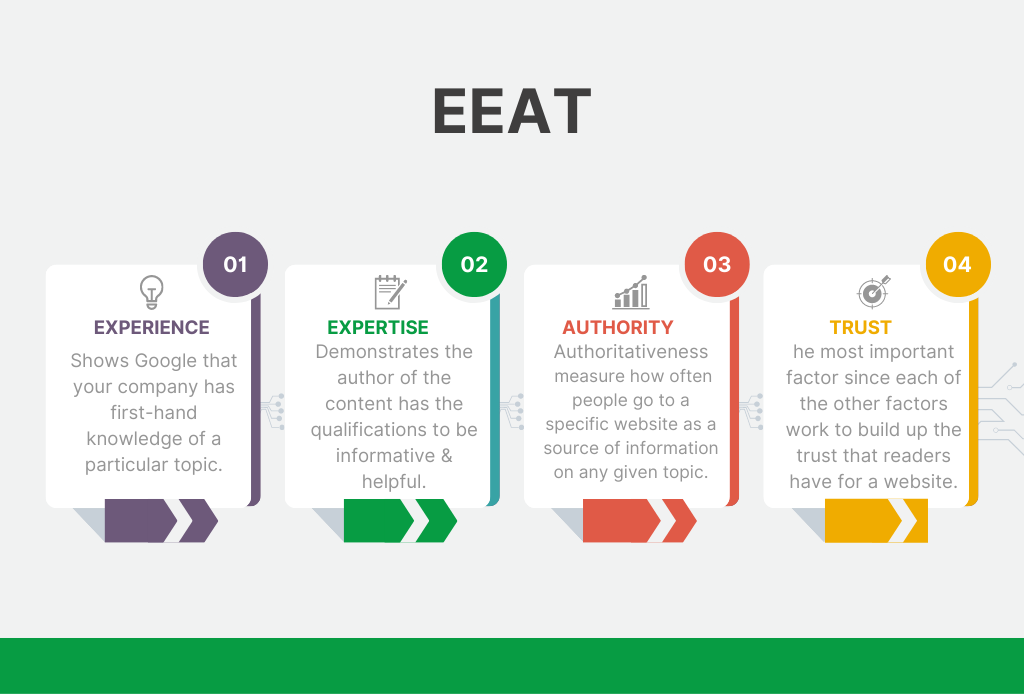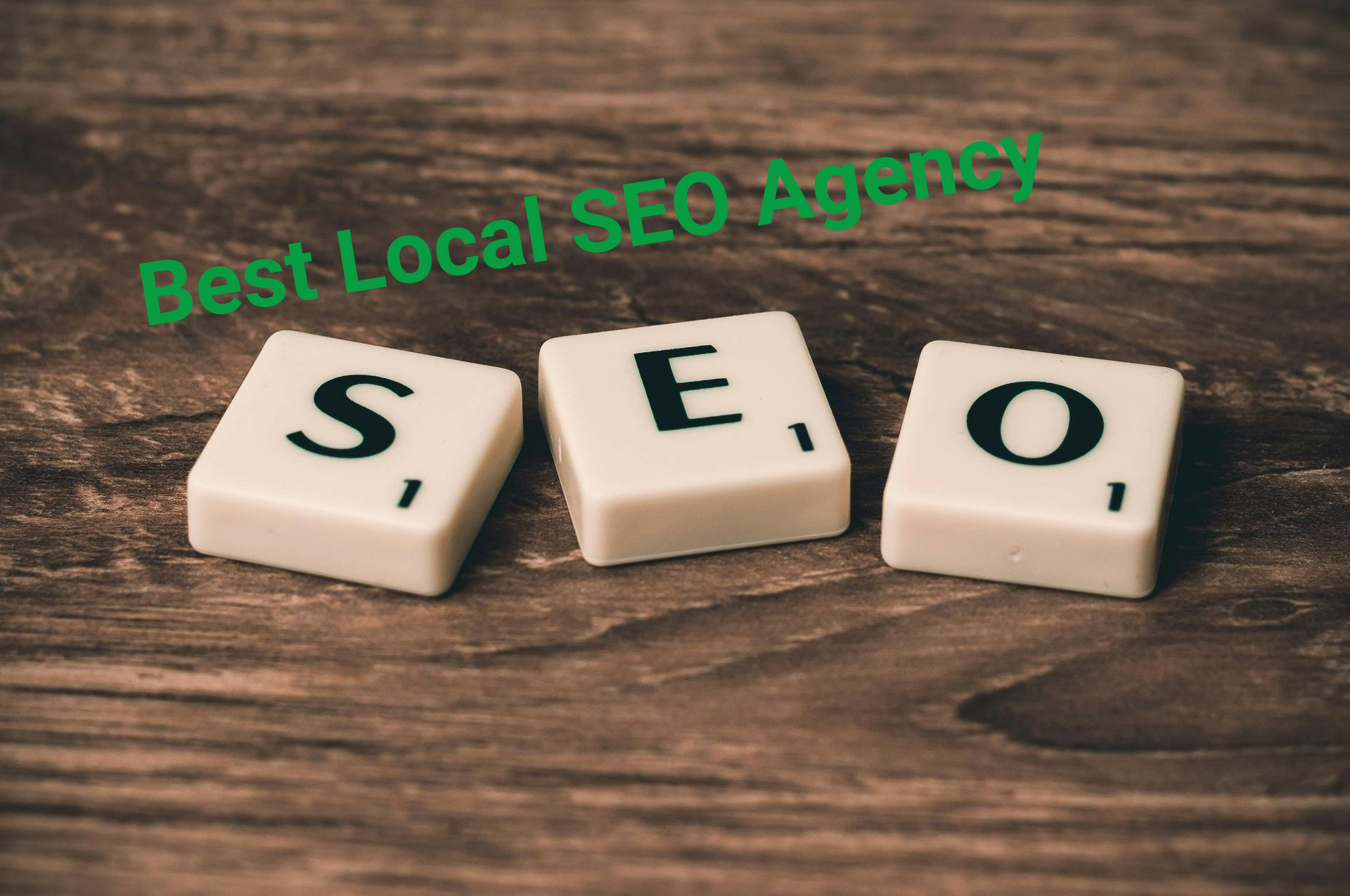What is EEAT: The Definitive Guide to Google’s Updated Quality Standards

As one of the largest companies in the world and the most popular search engine, Google is constantly making updates to its algorithms, quality guidelines, and processes to maintain the high standards they hold for the web pages that rank on its search engine. One of Google’s most important recent updates has been a change to its quality standards, also known as EEAT.
Previously known as EAT, the addition of an extra “E” to the acronym marks a shift in the way that Google assesses web page content. While this shift doesn’t currently change Google’s page rankings, it does shed light on how Google may rank web pages in the near future.
So what is EEAT and why is the additional “E” important for your website? What does it mean for your search quality ranking and how can it help you increase your site’s ranking? Luckily, ClickReady is here to answer any questions you may have about EEAT.
What is EEAT?
EEAT is an acronym that stands for experience, expertise, authoritativeness, and trust. Each of these factors are used by Google to judge the quality of a webpage and its author. While the acronym was previously known as EAT, Google recently added experience as an important factor when judging a web page’s content.
Experience
The newest addition to the EEAT acronym, experience shows Google that your company has the first-hand knowledge needed to be an expert on a given topic. When looking for experience, Google’s quality raters will judge if your content demonstrates that your company is proficient in your industry. For example, when discussing the side effects of anti-anxiety medications, a qualified psychiatrist with 20 years of work history and several awards would be considered much more experienced than a college student majoring in business or economics. Google takes these factors into account when assessing your website.
Expertise
Similar to experience, expertise demonstrates that the author of a website’s content has the appropriate qualifications and knowledge to provide accurate, informative, and helpful information. Let’s say that NASA writes an article on a new planet that it recently discovered, then another company writes a separate article on the same topic. An employee at NASA would have much more expertise on this topic than someone who stargazes recreationally. That’s because a person’s expertise is a combination of their experience, knowledge, and qualifications. A writer’s expertise can help determine if their article is the best choice for readers wanting to learn more about a specific topic.
Authoritativeness
Authoritativeness helps measure how often people go to a specific website as a source of information on any given topic. Content that shows its author’s experience and expertise usually receives a fair amount of backlinks and traffic that add to its authoritativeness. Websites that include content on similar topics are often seen as far more authoritative on a subject compared to websites with little traffic, few backlinks, and no related content.
Trust
Trust is the most important factor in EEAT since each of the other three factors (experience, expertise, and authoritativeness) work to build up the trust that readers have for a website. The purpose of Google’s
search visibility ratings has always been to establish how Google can order page rankings to showcase the most reliable and trustworthy pages on the Internet. Websites that don’t demonstrate experience, expertise, and authoritativeness are usually considered untrustworthy, while websites that exemplify EEAT principles are often relevant to a reader’s search.

How is EEAT determined?
Now that you’ve learned the basics of EEAT, you may be wondering how Google determines your EEAT ranking. A page’s EEAT ranking is determined by Google’s search raters, a team of people from all over the world who analyze and rank websites into four different levels. These levels are:
- Lowest EEAT
- Lacking EEAT
- High EEAT
- Very high EEAT
Google’s search raters rank your page’s EEAT level by checking it for the four factors found in the EEAT acronym: Experience, expertise, authoritativeness, and trust.
First, they’ll judge the author’s experience. Does the author have a reasonable level of experience in related fields or industries? Next, they’ll check for expertise. Does the author clearly illustrate their qualifications to give expert opinions on the given subject? Then, they’ll examine the site’s authority on the subject. Does the site have a lot of traffic, backlinks, and related articles? Finally, they’ll evaluate the site’s trustworthiness. Does the company have an adequate amount of experience, expertise, and authoritativeness to be considered a trustworthy and helpful source for readers? After checking for all of these factors, Google’s search raters will give your page an EEAT level based on your score.
Why does Google care about EEAT?
You may be wondering why Google cares about your website’s level of experience, expertise, authoritativeness, and trustworthiness. Google has always tried to highlight helpful content on its search engine. They want to reward websites that provide users with informative and accurate content while protecting users from inaccurate, unhelpful, or even harmful websites.
Google implemented its original EAT principles to determine how its search engine rankings were accomplishing this goal. While the new EEAT policy doesn’t affect your search ranking yet, Google will learn from this process and eventually update its search rankings based on the results. That’s why it’s so important to understand and implement EEAT principles on your website as soon as possible.
Another reason that Google is prioritizing EEAT is the increase in AI-generated content. While AI writing tools are helpful for quickly releasing content, AI-generated content is often inaccurate, outdated, or even harmful. If a user is searching for medical information, then it’s important to share up-to-date and accessible content since inaccurate content could harm the user. Since AI writing tools aren’t advanced enough to demonstrate things like experience, expertise, authoritativeness, and trustworthiness, Google is likely using EEAT to combat the rise of AI-generated content on their search engine.

The Relationship Between EEAT and SEO
Business owners who have already invested a lot of time and money towards implementing SEO on their sites may be wondering how EEAT will ultimately affect their search engine rankings. While EEAT and SEO don’t directly affect each other, the factors that determine a good EEAT ranking are similar to the factors that determine your SEO ranking. This means that following EEAT policies will likely have a positive impact on your SEO rankings as well.
When creating SEO optimized content, writers want to target specific audiences, stay relevant to their interests, and provide helpful information. SEO keywords are used to help writers provide content that will benefit readers. EEAT tries to accomplish the same things by encouraging content that is helpful to readers, accurate, and relevant to the readers’ interests. If you’re following proper SEO practices, then you’re likely already utilizing some common EEAT policies. While your SEO and EEAT rankings don’t directly affect each other, their goals are so similar that increasing one ranking will likely improve the other too.
How can you increase your site’s EEAT ranking?
Now that you understand the relationship between EEAT and SEO, you may be wondering how to increase your website’s EEAT ranking. Luckily, you can increase your site’s EEAT ranking with a few easy tips and tricks. While some of these tips may take more time and effort than others, they’ll show Google’s search raters that you’ve got hands-on experience in your field, you’re an expert on the topic, your website is an authority on this subject, and your readers can trust your information.
Prioritize Content That Demonstrates EEAT
One of the best ways to improve your EEAT ranking is to ensure your content strategy is built upon EEAT principles. One way to do this is by telling your readers about your experiences in this field and talking about your expertise on the topic. You can also make certain that your website is authoritative by using professional SEO strategies to improve your traffic, increase your number of backlinks, and include related posts at the bottom of your article.
Build Trust in Your Pages
The ultimate goal of improving your website’s experience, expertise, and authoritativeness is to increase the trust that readers can have in your website. So, the more you can utilize the first three letters in the acronym, the more you can build up to the last one, leaving both your readers and Google’s quality raters confident in the information you are presenting on your website.
Build Your Personal Brand Through Author Bios and LinkedIn
Now that Google has added experience to its EEAT principles, there’s a newfound importance on a site page’s author. Google checks your entire website to see if there are multiple related articles written by the same author and if those topics are relevant to your business. This is one way that Google determines both your experience and expertise.
If you haven’t already, now is the best time to start building your personal brand. One easy way to do this is to include an author bio in your content. Even better, you can link these author bios to your professional LinkedIn account. Including author bios shows Google that not only did you write this specific article, but you’ve also written related articles in the past, which means you’re a reliable and trusted source of information on this topic. Linking those bios to LinkedIn then helps Google recognize you as a real human author instead of an AI writing program.
Improve Page Functionality
One easy way to improve your website’s authority score is by improving your pages’ functionality. While you may have already done this when working on your website’s SEO, it’s never too late to improve your website’s functionality. Since spam sites are usually slow or difficult to use, Google tends to promote high-quality websites that run quickly and are easy to navigate. Not only will improving your pages’ functionality help users navigate your site, it will also show Google that your website can be trusted as a valid source of information. Using a site audit tool such as SEMRush can help improve page quality.
Utilize Linking
Another way for Google to determine your EEAT ranking is by assessing the number of internal and external backlinks on your site. Using internal links on your pages is a great way to highlight similar articles on your site, while external links show that you received your information from a reliable source. Internal and external links also help Google bots navigate your website quickly and make your site more accessible to readers. Linking is a great way to show your authority on certain topics and build your trustworthiness.
Create and Maintain a Positive Online Reputation
Since Google places a greater emphasis on trustworthiness, it’s crucial to build and maintain a positive reputation online. Doing this will show Google that your website and company are trustworthy. It also tells Google that your visitors are receiving helpful and accurate information from a knowledgeable expert in their field.
ClickReady Is Here to Help
If you’re interested in boosting your site’s EEAT ranking, ClickReady is here to help. As SEO and EEAT experts, we are ready to help you demonstrate the experience, expertise, authoritativeness, and trust you need in order to get a high EEAT ranking from Google. We will help you do this by assisting you with creating content, growing your personal brand, improving the functionality of your page, utilizing internal linking, and creating and maintaining a positive reputation. Check out guide to digital marketing to learn more!





